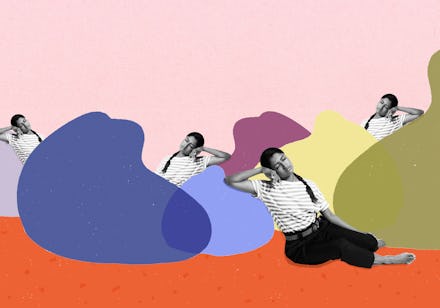Is CBN the new CBD? The sleep science of this trendy weed compound, explained

As a cannabis user who perennially struggles with sleeplessness, the emergence of weed products specifically marketed as sleep aids has been hard for me to ignore. Many of these products — gummies, tinctures, and sublingual strips, for example — contain cannabinol, or CBN for short, a compound in weed that doesn’t get you high but supposedly has sedating properties. Can CBN really help you sleep, though?
All of this reminds me of the plethora of products containing cannabidiol, a.k.a. CBD, another non-inebriating compound in cannabis, which purportedly helps you chill. Over the years, though, we’ve learned that much of the claims about CBD are based more on hype than on scientific evidence. As a result, I’m pretty skeptical about any “trending” cannabis-derived compound, CBN included. To help me separate solid science from marketing fluff, I turned to my go-to expert for all things cannabis, Lewis Nelson, chair of the department of emergency medicine and chief of the division of medical toxicology at Rutgers New Jersey Medical School.
First things first: What is CBN? Like CBD and tetrahydrocannabinol, or THC, the compound in weed that gets you lit, CBN is part of a class of compounds known as cannabinoids, Nelson explains. Cannabinoids work by binding to endocannabinoid receptors, which are scattered throughout the body and play a role in appetite, sleep, and a number of other bodily functions.
Nelson tells me that while CBN is marketed as “more sedating” than other cannabis compounds, the data supporting this claim is “certainly not hard science.” In other words, there haven’t been clinical trials in which scientists randomly assigned half of the participants to take escalating doses of CBN and the other to take escalating doses of another cannabinoid, he explains.
Instead, Nelson says that most of the evidence has come in the form of surveys and user reports that more or less involve someone giving respondents CBN, telling them it can help them sleep, and asking if they feel sleepy after taking it. Scenarios like these are especially susceptible to the placebo effect, the phenomenon in which your expectation of a drug’s effect shapes your experience of it — in the case of CBN, that it'll make you groggy.
That’s not to say that the drowsiness you feel after consuming CBN is all in your head. If you swear by a CBN-containing Incredibles Snoozzze Berry gummy or Kin Slips's Shut Eye Sublingual Strip every night, then CBN helps you sleep. But it might be because of the night sky on the packaging and other cues that make you expect it to help you doze off — not necessarily the CBN doing anything on a pharmacological level.
But why did cannabis brands zero in on CBN in particular as a sleep aid? I personally couldn’t find anything that illuminated the underlying rationale, other than a study reporting that two derivatives of CBN synthesized in the lab made mice sleep longer. The thing is, the mice were given the strong sedative pentobarbital beforehand — and they were, well, mice — making it hard to conclude whether CBN alone would have any meaningful somnolent effects in humans.
Nelson believes the rise in popularity of CBN as a sedative probably started with someone feeling sleepy after taking CBN, spreading the word, and other people buying into it. “It’s a bit more of a religion perhaps than it is a pharmacological reality,” he says. “When you go and look in the medical literature, there’s just not a lot of support for any of these things.”
To be fair, he points out that the illegality of cannabis on a federal level can make conducting and securing funding for research on it difficult. Plus, a study identifying, say, a strain that makes you sleepy, doesn’t promise a huge return on investment for pharma companies.
“I think, ultimately, cannabinol was probably just a substance that was identified, and a story was built around it,” Nelson says. That doesn’t mean you need to toss your CBN gummies, per se — just that this story might be what puts you bed, not the CBN itself.